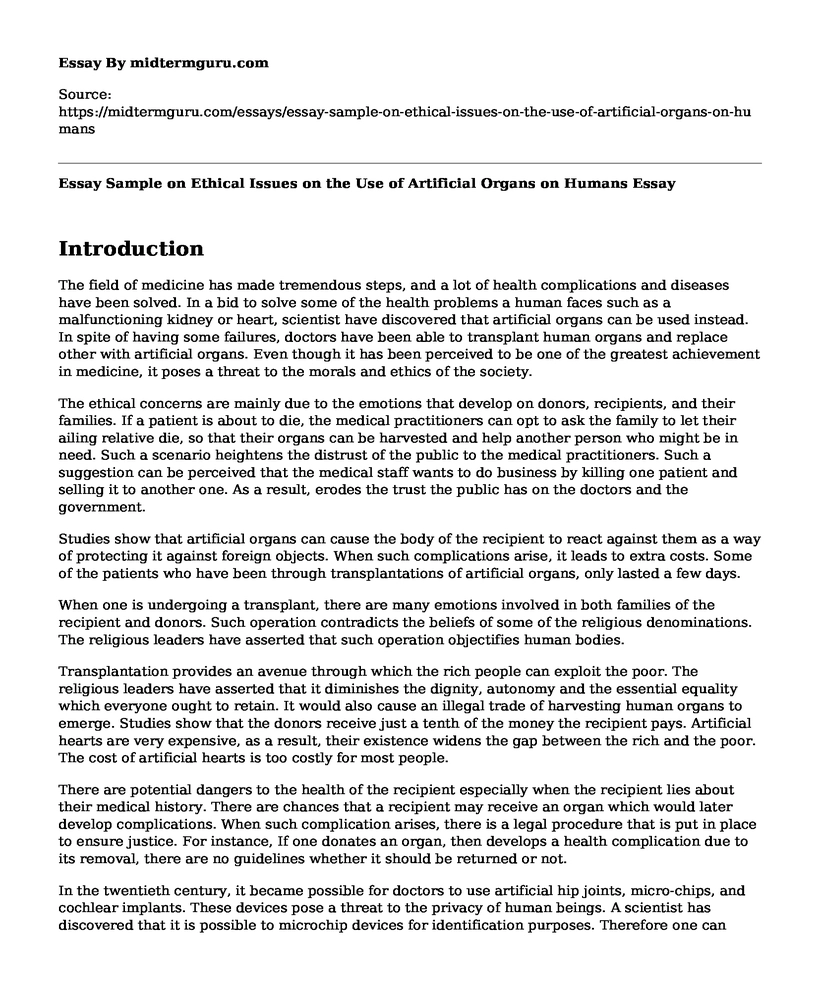Introduction
The field of medicine has made tremendous steps, and a lot of health complications and diseases have been solved. In a bid to solve some of the health problems a human faces such as a malfunctioning kidney or heart, scientist have discovered that artificial organs can be used instead. In spite of having some failures, doctors have been able to transplant human organs and replace other with artificial organs. Even though it has been perceived to be one of the greatest achievement in medicine, it poses a threat to the morals and ethics of the society.
The ethical concerns are mainly due to the emotions that develop on donors, recipients, and their families. If a patient is about to die, the medical practitioners can opt to ask the family to let their ailing relative die, so that their organs can be harvested and help another person who might be in need. Such a scenario heightens the distrust of the public to the medical practitioners. Such a suggestion can be perceived that the medical staff wants to do business by killing one patient and selling it to another one. As a result, erodes the trust the public has on the doctors and the government.
Studies show that artificial organs can cause the body of the recipient to react against them as a way of protecting it against foreign objects. When such complications arise, it leads to extra costs. Some of the patients who have been through transplantations of artificial organs, only lasted a few days.
When one is undergoing a transplant, there are many emotions involved in both families of the recipient and donors. Such operation contradicts the beliefs of some of the religious denominations. The religious leaders have asserted that such operation objectifies human bodies.
Transplantation provides an avenue through which the rich people can exploit the poor. The religious leaders have asserted that it diminishes the dignity, autonomy and the essential equality which everyone ought to retain. It would also cause an illegal trade of harvesting human organs to emerge. Studies show that the donors receive just a tenth of the money the recipient pays. Artificial hearts are very expensive, as a result, their existence widens the gap between the rich and the poor. The cost of artificial hearts is too costly for most people.
There are potential dangers to the health of the recipient especially when the recipient lies about their medical history. There are chances that a recipient may receive an organ which would later develop complications. When such complication arises, there is a legal procedure that is put in place to ensure justice. For instance, If one donates an organ, then develops a health complication due to its removal, there are no guidelines whether it should be returned or not.
In the twentieth century, it became possible for doctors to use artificial hip joints, micro-chips, and cochlear implants. These devices pose a threat to the privacy of human beings. A scientist has discovered that it is possible to microchip devices for identification purposes. Therefore one can board a plane without a ticket. However, the public would fear that their location is closely monitored. If such microchips could fall in the wrong hands, they can be used to manipulate people. People can be forced to commit terrorist attacks.
Conclusion
The use of artificial organs and implants poses a threat to the moral and ethical status quo of society. The families of donors and recipients go through emotional distress, and there are no legal policies that can guide such transactions. The technology can be used to cause security issues and also cause the gap between the rich and the poor to widen.
Cite this page
Essay Sample on Ethical Issues on the Use of Artificial Organs on Humans. (2022, Sep 28). Retrieved from https://midtermguru.com/essays/essay-sample-on-ethical-issues-on-the-use-of-artificial-organs-on-humans
If you are the original author of this essay and no longer wish to have it published on the midtermguru.com website, please click below to request its removal:
- Essay Sample on Drug Price Control
- Presentation Outline on Chocolate: Pros and Cons
- The Role of Public Health in Social Care - Essay Sample
- Integumentary System: Skin, Sensors, Anatomy & Function - Essay Sample
- Human Growth: From Conception to Fetal Stage - Essay Sample
- 2 Best Practices to Prevent Breast Cancer in Men & Women - Research Paper
- Affordable Healthcare: Todd and Reginald Case Study







